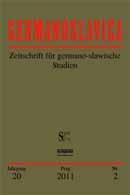Endstation Russland: Motiv des Ostens und des Kriminellen in den Werken von Robert Musil
Final destination - Russia: the East and Crime in Robert Musil’s works
Author(s): Maria KiselevaSubject(s): Language studies
Published by: AV ČR - Akademie věd České republiky - Slovanský ústav and Euroslavica
Summary/Abstract: The first part of this article studies Robert MUSIL’s reflection on the symbol of Russia and Fyodor DOSTOYEVSKY’s main questions that he covers in his fundamental novels and in ‘the Writer’s Diary’. In his works there are many references, related to DOSTOYEVSKY’s ideas and partially to the East issues. Referring to DOSTOYEVSKY’s characters, considering certain episodes of Russian history, describing the performance of Russian actors in Berlin MUSIL keeps comparing two cultures of two different countries that are getting into crisis. On one hand he views a higher artistic potential in the East that Europe has not reached. But on the other hand the East represents something mystical, unexplainable, illogical, and irrational, where everything is possible because of weakness of law. MUSIL is especially interested in the crime issue in DOSTOYEVSKY’s novels; he faces the same circle of problems; the situation in Europe is becoming more similar to the one that DOSTOYEVSKY depicted. Next two parts of the article portray other similarities between these two writers, analyzing parallel structure and relation to the main idea in the texts of the writers, revealing two types of murderers, and the motives of their crimes. The first one commits the crime, influenced by his own theory (e. g. Raskolnikov in Crime and Punishment and Reiting in The Confusions of Young Törless, Ivan in The Brothers Karamazov and Ulrich in The Man Without Qualities). The second murderer breaks the law, using the theory of others; he might also act illegally because he is insane and can not be responsible for his own deeds (Smerdyakov in The Brothers Karamazov and Moosbrugger in The Man Without Qualities). The key motive that connects these two types is based on the “tempting” motive, connecting with the doubleganger phenomenon. In fact, at the end of the article the doubleganger phenomenon is considered to be highly important; it serves as the main reason for the characters’ crimes. Many doublegangers through their criminal actions advocate Antichrist but are mistakenly supposed to be Saviors. Thus, they personify Antichrist. Both DOSTOYEVSKY and MUSIL raise the question in their works, ‘If the real Savior comes.’ This question is being analyzed in the following article.
Journal: Germanoslavica
- Issue Year: XXII/2011
- Issue No: 2
- Page Range: 66-83
- Page Count: 18
- Language: German
- Content File-PDF

